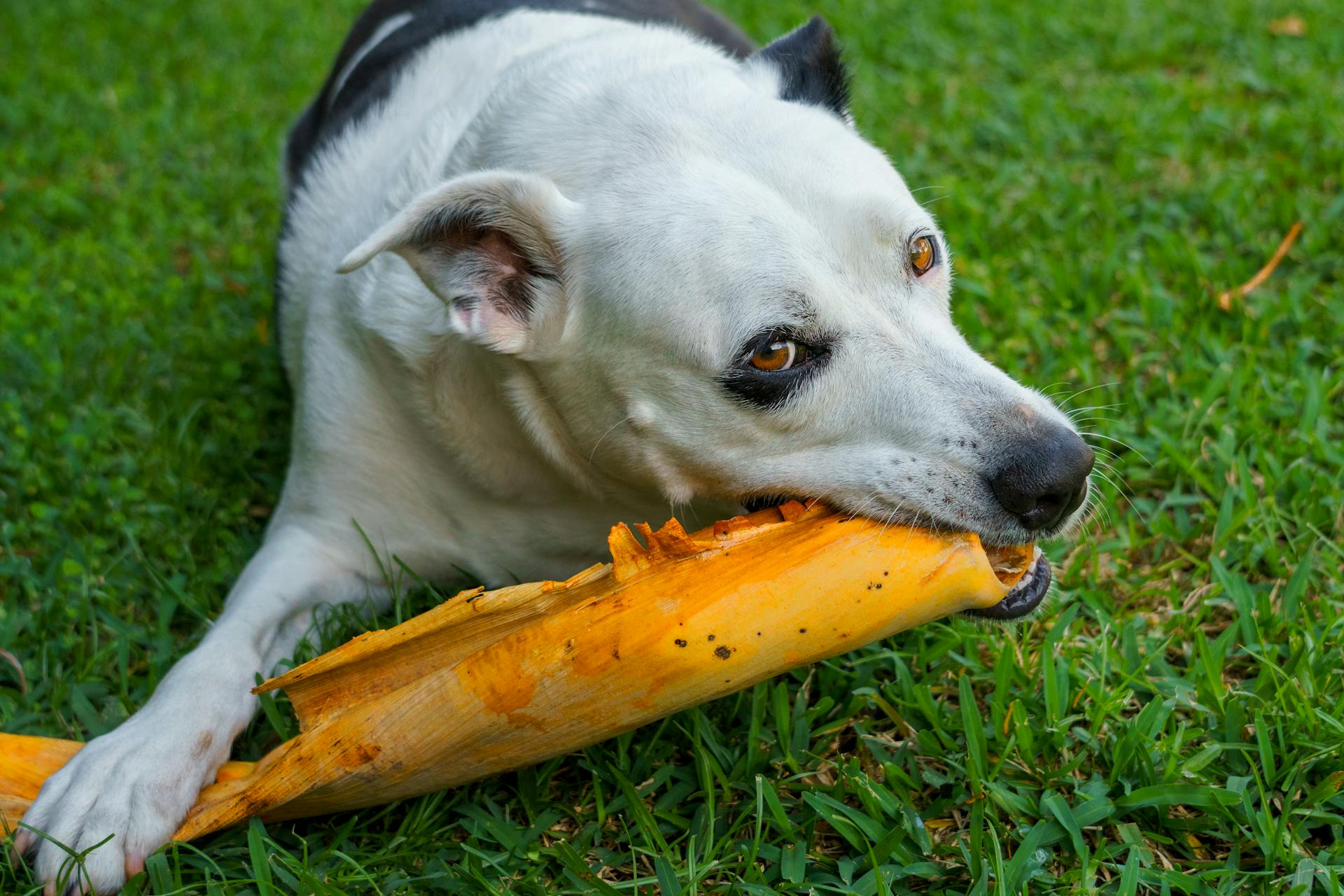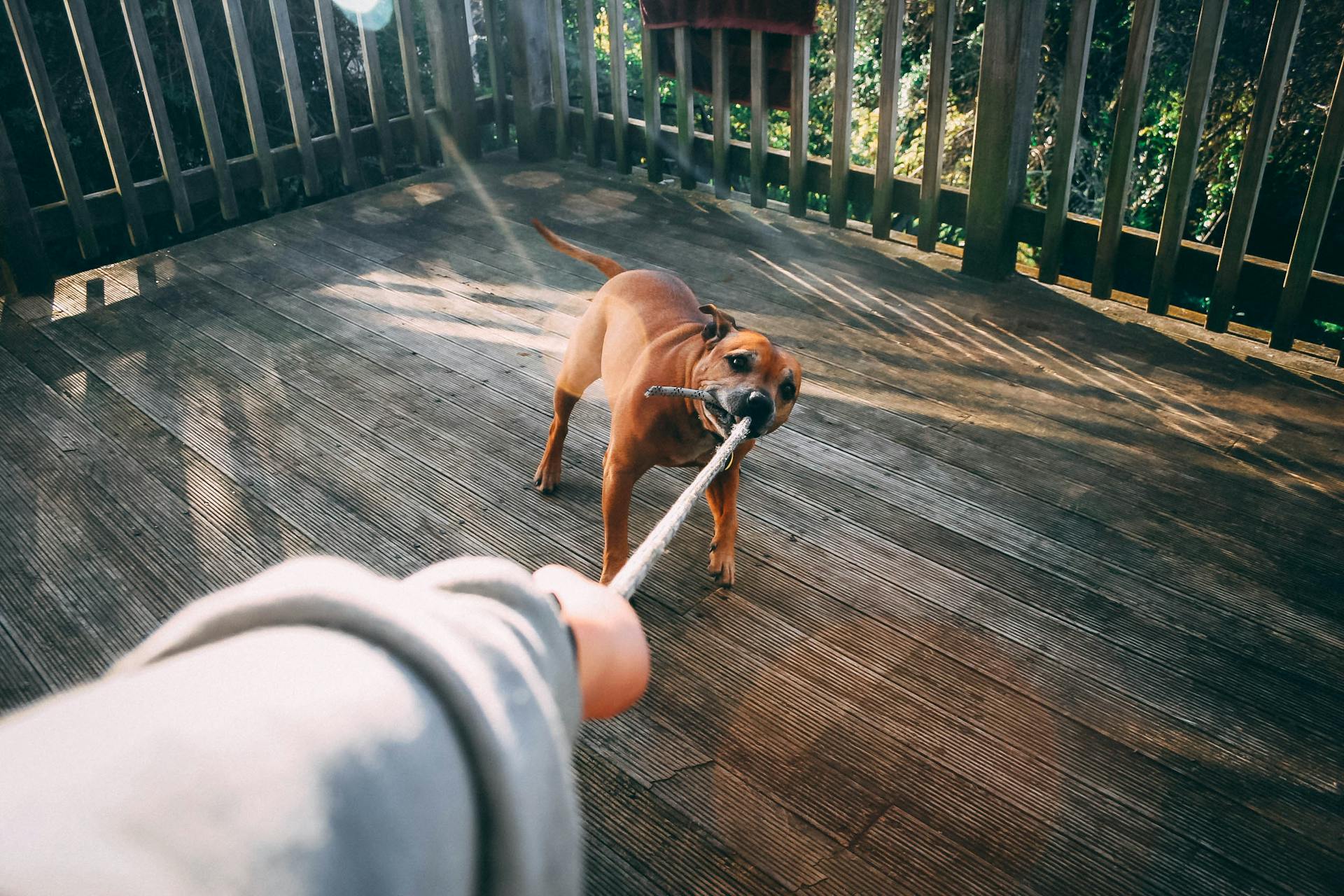
Dog bites can lead to serious infections, and it's essential to know how to prevent them and what treatment options are available.
Rabies is a fatal viral disease that can be transmitted through dog bites, and it's found in many parts of the world, including the United States.
To prevent infections, it's crucial to clean the wound immediately with soap and water, and seek medical attention if symptoms persist or worsen.
Antibiotics are often prescribed to treat bacterial infections caused by dog bites, and they can be administered orally or through an injection.
Know the Risks
Children are more likely than adults to be bitten by a dog, and the injuries from dog bites in children can be more severe. This is a concerning fact, especially when you consider that most dog bites affecting young children occur during everyday activities and while interacting with familiar dogs.
Having a dog in the household increases the likelihood of being bitten, and the more dogs you have at home, the higher the risk. For example, adults with two or more dogs in the household are five times more likely to be bitten compared to people living without dogs at home.
Men are more likely than women to be bitten by a dog, which is worth noting for households with both men and women. This is a simple fact that can help you take extra precautions to prevent dog bites.
Here are some key statistics to keep in mind:
By understanding these risks, you can take steps to prevent dog bites and keep yourself and your loved ones safe.
Prevention and Safety
Any dog can bite, especially when scared, nervous, eating, or playing with toys or puppies.
To avoid dog bites, practice safe handling tips at home and within your community.
It's essential to wash the wound as soon as you're bitten and use topical antibiotics, such as povidone iodine, in and around broken skin.
Keep the wound covered and change bandages daily to prevent infection.
Infections can spread quickly throughout the body, so keep an eye on the wound for signs of infection, which can appear within 24 hours to 14 days after being bitten.
Never approach a dog you don't know, no matter how adorable they may look, and avoid roughhousing or playing aggressively with dogs, including those you know.
Protect Your

Protecting yourself and your loved ones from dog bites is crucial. Nearly 1 in 5 people bitten by a dog requires medical attention.
Dog bites can happen to anyone, especially when a dog feels scared, nervous, or protective of its toys or puppies. Any dog can bite, regardless of its breed or temperament.
To prevent dog bites, it's essential to practice safe handling tips. These tips can help you avoid dog bites and keep yourself and your loved ones safe.
Protecting your dog from ticks is also vital for their health. Talk to your veterinarian about the best tick prevention products for your dog and tickborne diseases in your area.
Checking your dog for ticks every day can significantly reduce the chances of a tick bite making your dog sick. This is especially important after they spend time outdoors.
Keep Your Outside Free
Keeping your dog outside can be tempting, especially if you have a big yard. But it's not recommended to keep dogs tied up outside, as it's illegal in some areas.
Dogs that are tied up are more likely to bite than those roaming freely in a fenced yard. This is a crucial consideration for both your dog's safety and the safety of others.
Tying your dog outside can also lead to boredom and stress, which can cause behavioral problems.
Dealing with Bites and Scratches
If you're bitten or scratched by a dog, germs can be spread, even if the wound doesn't seem deep or serious.
Wash the wound thoroughly with soap and water, apply an antibiotic cream, and cover it with a clean bandage for minor wounds.
Apply pressure with a clean, dry cloth to stop the bleeding for deep wounds, and seek medical attention right away.
Call 911 or your local emergency medical services immediately if you can't stop the bleeding or you feel faint or weak.
Serious wounds are characterized by uncontrolled bleeding, extreme pain, and loss of function.
Infected wounds may be red, painful, or swollen, or cause a fever.
Let the healthcare provider know that you were bitten by a dog, as they may consult with your state or local health department to decide if you need rabies treatment.
If the injury is serious, go to the emergency room. That's also a good idea if you're bitten by an unknown or stray dog.
Explore further: How to Stop Dog Biting Lead
Emergency rooms are often crowded with long waits, so an urgent care clinic is a good option if the injury doesn't require immediate attention.
Some wounds require stitches, ideally within 12 to 24 hours.
The doctor may prescribe antibiotics to prevent possible infections, especially if you have health problems.
You may also need a tetanus booster if you haven't had one in the past 10 years.
All dog bite wounds, even minor ones, should be monitored for signs of infection until they're completely healed.
Check the bite often to see if it becomes red, swollen, warm, or tender to the touch.
If the wound gets worse, you feel pain, or develop a fever, see a doctor immediately.
Here are some signs of infection to watch out for:
- Redness
- Swellings
- Warmth
- Tenderness to the touch
Infection and Complications
Dog bites can cause several complications, including infections, which can be serious and even fatal if left untreated.
Bacteria like staphylococcus, pasteurella, and capnocytophaga can live in a dog's mouth and cause bacterial infections if the bite breaks the skin.
The risk of infection is higher in people with weakened immune systems or diabetes.
If you've been bitten by a dog and notice signs of infection, such as redness, swelling, or pus, see a doctor right away.
Infections can spread quickly throughout the body, so it's essential to monitor the wound and seek medical attention if you experience any of the following signs: redness that spreads to cover a larger area, fever over 100.4 degrees F, increased pain, excessive drainage, black edges around the wound, or yellow or green pus.
Bites on the hands or feet carry a higher risk of infection, and certain infections can be fatal if not treated promptly.
Here are some common signs of infection:
- Redness that spreads to cover a larger area or red streaks extending from the bite
- Fever of 100.4 degrees F or higher for more than four hours
- Increased pain that does not resolve with over-the-counter pain medication
- Excessive drainage
- Black edges around the wound, which is a sign of dead tissue
- Yellow or green pus
If you experience any of these symptoms, contact your healthcare provider immediately.
Treatment and Care
When treating a dog bite, it's essential to prioritize the safety of all involved. Secure the dog away from the person who has been bitten, and if necessary, contact animal control or the police.
Stop bleeding by applying direct pressure to the wound using a clean towel or cloth. This is crucial, as deep bites can bleed heavily. Wash your hands thoroughly with soap and water before touching the wound, and consider wearing sterile gloves if you have them.
Cleaning the area is crucial to prevent infection. Use soap and warm water to clean the wound, and flush away dirt and bacteria by running water over the wound for about five minutes. Then, wash with gentle soap and water and rinse thoroughly for about three minutes to remove all soap.
Antibiotics may be prescribed as a precaution for bites that cause deep puncture wounds or have a high risk of infection. This is especially true if the wound is dirty or has not been cleaned properly. A tetanus shot may also be necessary if it has been five years since your last booster.
Here are some possible treatments for dog bites:
In some cases, stitches may be necessary to close the wound, especially if it's on the face. If the person has not had a tetanus vaccine in the last 5 years, they may need to have one to reduce the risk of tetanus.
Rabies and Vaccination
Rabies is a serious viral condition that affects the central nervous system and can be fatal if left untreated. It's 100 percent preventable when immediate medical treatment is received.
If you're bitten by a dog that shows signs of rabies, such as acting erratically or foaming at the mouth, you should get a rabies vaccine. This is because rabies is a potentially fatal condition that can be transmitted through animal bites.
All dogs should be vaccinated for rabies, and the shots last three years, although some states require annual rabies boosters. This is especially important for dogs that are stray or have an unknown vaccination status.
If a dog bites you and you're unsure of their vaccination history, or if the dog is not up-to-date on its rabies vaccinations, seek immediate medical attention. This is crucial because the risk of contracting rabies is minimal, but it's more likely if the dog is a stray or has an unknown vaccination status.
Take a look at this: Lyme Disease Vaccination for Dogs Side Effects
The post-exposure rabies vaccine is given as a series of four injections, over the course of several weeks, and an additional injection of rabies immune globulin is also required. If the dog is up-to-date with its shots, you should still see your healthcare provider in the next 24 hours for any dog bites that break the skin.
Here are the signs of rabies in humans:
- a headache, fever, and other flu-like symptoms
- weakness
- an itching or prickling feeling around the bite
If you think that the dog that bit you might have rabies, see your doctor straight away. Postexposure rabies vaccination can treat the infection, but it's essential to act quickly.
Reporting and Diagnosis
If you're bitten by a dog, it's crucial to report the incident to your local animal control agency or police department. This is especially important if you're unsure if the dog has been vaccinated against rabies.
You'll need to provide the owner's contact information, including their name, address, and phone number, as well as the rabies vaccine license number and the name of the veterinarian who administered the vaccine.
If the bite breaks the skin, seek medical attention from a healthcare provider as soon as possible. They'll want to know the date and time of the injury, whether the dog is up-to-date on shots, and if the dog can be observed for 10 days.
Report
Reporting a dog bite is crucial to prevent the spread of rabies. If you're bitten by a dog, consider contacting your local animal control agency or police department to report the incident.
It's especially important to report the bite if you don't know if the dog has been vaccinated against rabies. The dog may appear healthy, but it could still be a carrier of the disease.
To report the bite, you'll need to gather some information from the owner. This includes the rabies vaccine license number, the name of the veterinarian who administered the vaccine, and the owner's name, address, and phone number.
You can use the following information to report the bite:
- Rabies vaccine license number
- Name of the veterinarian who administered the vaccine
- Owner's name, address, and phone number
Diagnosis
A healthcare provider should evaluate any dog bites that break the skin, usually within a day if the bite doesn't seem serious.
The provider will want to know the date and time of the injury, as well as the dog's owner.
Whether the dog is up-to-date on shots is also crucial information.
The provider will also want to know if the dog can be observed for 10 days.
A healthcare provider will also ask about the forcefulness of the bite and your symptoms, as well as any changes to the wound since the bite.
You should be prepared to share the approximate date of your last tetanus shot.
Here are the key details your healthcare provider will want to know:
- Date and time of the injury
- Dog's owner
- Whether the dog is up-to-date on shots
- If the dog can be observed for 10 days
- Forcefulness of the bite
- Symptoms and changes to the wound
- Approximate date of last tetanus shot
Frequently Asked Questions
Do I need a tetanus shot after a dog bite?
If you've been bitten by a dog and your last tetanus shot was more than 5 years ago, you should get a tetanus vaccine as soon as possible to prevent a potentially life-threatening infection. Consult a doctor or healthcare professional for guidance on getting vaccinated.
Do I need antibiotics after a dog bite?
Antibiotics are usually not needed for dog bites if the wound is superficial and easily cleaned, but consult a doctor to determine the best course of treatment
Sources
Featured Images: pexels.com


